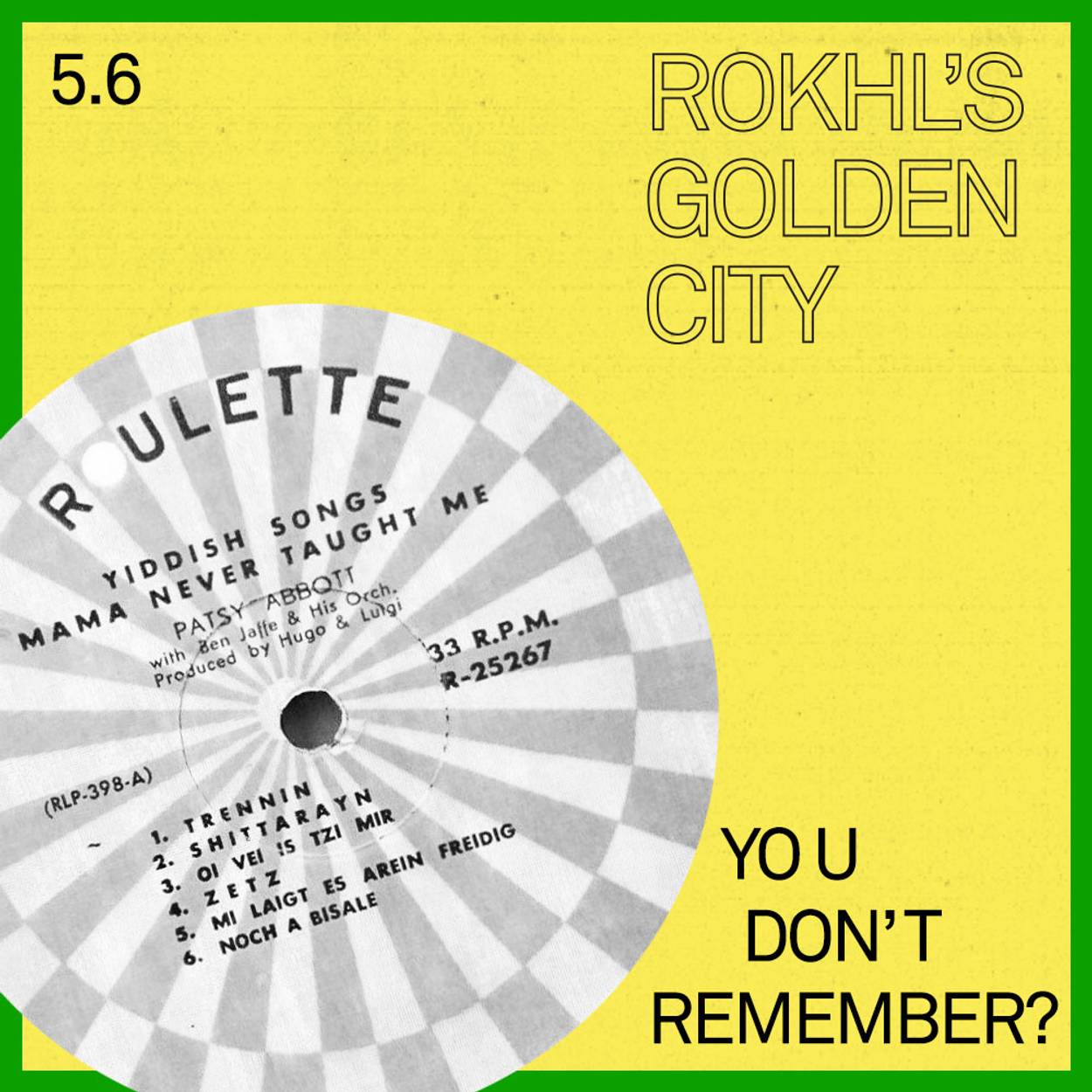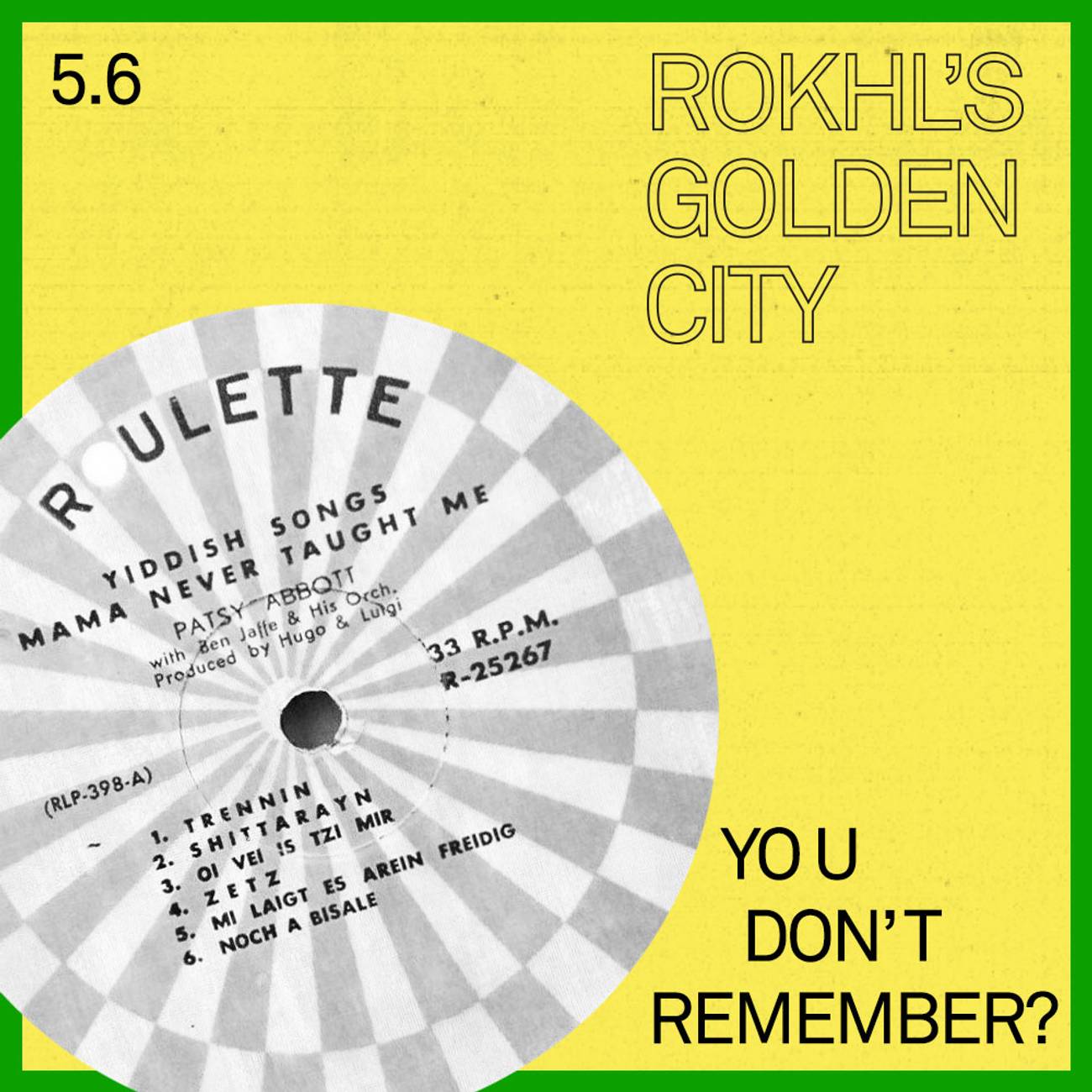Red Hot Yiddishe Mamas
Rokhl’s Golden City: What a pair of LPs can teach us about the nature of the Jewish family




Two LPs sit next to each other on the shelf above my record player, their very proximity abuzz with juicy domestic drama. One, a raunchy Yinglish comedy record by a “mature” female singer-comedienne, the other, a middle-of-the-road collection of Yiddish chestnuts by a very young male performer. Taken separately, each record is its own musical curiosity, deserving of a listen (or more). Taken together, they form an intervention on the nature of the American Jewish family.
In her 2007 book, You Never Call! You Never Write!: A History of the Jewish Mother, historian Joyce Antler argues that the figure of the monstrous Jewish mother was gaining pop cultural import at midcentury. The Jewish mother became the stand-in for all manipulative, intrusive, and guilt-inducing mothers. She might be a self-sacrificing martyr going to comical lengths to care for her children, or she might be a greedy, grasping narcissist, but she was a “colossal figure, her negative imprint all over the lives of her children.” And as a representation of all that was crude, provincial, and old fashioned, the Jewish mother was there to be rebuked so that the child (most often the son) could become modern.
But where these two particular records intersect on my shelf, they create a moment of reflection, as well as an escape from the inescapable “maternal tyrant” the Jews so graciously gave to American culture.
First is Joel Grey’s Songs My Father Taught Me: A Young Approach to Loved and Remembered Folk Melodies (1953). It’s a collection of chestnuts like “Tum Balalaika,” with some newly composed English translations and the odd Israeli number. Grey’s father, of course, was the legendary klezmer clarinetist and comedian Mickey Katz. Katz’s orchestra is featured on the album, but dialed way down from the high octane, precision playing featured on Katz’s own albums. On the cover, a baby-faced Grey (he was in his early 20s when he made the record) stands at the bottom right corner, in front of a wall of family pictures. It’s a tableau that suggests claims to authority and authenticity, as well as the orderly reproduction of Jewish domestic respectability. That impression is further pressed on the back, where Katz gives a glowing blurb. The final lines of the album notes herald Joel’s marriage and Mickey’s impatience for multiple grandchildren.
Next to Grey’s Songs My Father Taught Me is Yiddish Songs Mama Never Taught Me (1964) by Patsy Abbott with Ben Jaffe & His Orchestra, an adults-only collection of reworked Yiddish folk songs and bawdy English-Yiddish tunes like “Fuchin” and “Shitt Arayn.” Abbott is the kind of artist who never paid for a double entendre when a single would do. Obviously it’s one of my most beloved records.
On the cover, a mother and daughter seem to have been caught midargument at the kitchen table. It’s an image that certainly taps into the zeitgeist Antler describes. The “daughter” is rolling her eyes as the mother throws up her hands in defense (or perhaps offense). A mouthwatering deli spread is arranged before them, more than enough for two people. It’s the kind of cover that says, if you like your salami both literal and obscenely figurative, you’ve come to the right place.

Though these two album covers propose artists at odds, Abbott and Grey were already professionally entwined when Grey recorded Songs My Father Taught Me. They had both performed in Katz’s Broadway revue Borscht Capades and appear together on its cast album. They were only separated by a 10-year age difference, but their personas placed them in vastly different worlds. We think we know who Grey is: dutiful son and eager father-to-be. There he is on the cover, in his button-down shirt, ready to take his place in the chain of Jewish patriarchy. Abbott is harder to place. She most certainly isn’t a mother, but she understands their importance; after all, Mama is the one who doesn’t teach you the things you really need to know, right?
At midcentury, with the Jewish world shaken by the destruction of the previous decades, these two albums, and two personas, pose surprisingly heavy questions. In the newly reconstituted, suburbified American Jewish family, which parent is assumed to be authoritative? Is it the working class, aproned kitchen scold of Patsy Abbott’s Yiddish Songs? Or is it the proud papa in the tasteful headshot of Songs My Father Taught Me? And what happens to the things that are left untaught? The work of memory, and forgetting, hangs over both records.
In her essay “The Bad Girls of Jewish Comedy: Gender, Class, Assimilation, and Whiteness in Postwar America,” historian Giovanna P. Del Negro notes that in Abbott’s nightclub act, she took direct aim at the cultural amnesia common to upwardly mobile Jews. “Quick to refresh the memories of successful Jews keen on forgetting the harshness of their working-class immigrant past,” Del Negro writes, “Patsy Abbott commonly used ‘You don’t remember?’ as a coda to her jokes.” And because Abbott (and her peers Pearl Williams and Belle Barth) worked in the marginal spaces of nightclubs and “party records,” she could offer an enticing counternarrative to the grind of midcentury assimilation.
In her nightclub act, the brassy and sexual Abbott pushed back on a culture which insisted that women’s roles were solely as demure mothers and housekeepers. On Yiddish Songs, when Abbott sang about domestic matters, the point was either scatological, sexual, or simply to make a gratuitous Yiddish-English vulgar pun (as with “Shitt Arayn” [Add a Pinch]). Unlike the woman on the cover, the only appetite Abbott was concerned with was her own. Perhaps more importantly for her audiences, she pushed back on the non-Jews who asked Jews, sometimes politely, sometimes violently, to forget who they were. The people who came weren’t there just to hear Abbott speak outrageously about sex, they were also coming for a transgressive act of remembering, if only for a night.
In contrast to Yiddish Songs, Grey’s Songs My Father Taught Me is the very opposite of transgressive. I’m a huge fan of both Mickey Katz and Joel Grey, both giants in their fields, as far as I’m concerned. But Songs My Father Taught Me does not invite multiple listens. It’s got some good moments, but on the whole it’s lacking in the musical and comedic thrills offered by Katz’s best work. It’s the kind of product that leaves you wondering what exactly his father taught him.
Indeed, in a 2016 Fresh Air interview, Grey recounted that he didn’t speak any Yiddish, and that it had been not his father, but his aunt who taught him the Yiddish songs in his repertoire! As Grey revealed in his excellent 2016 memoir, Master of Ceremonies, just a few years before Grey joined his father in Borscht Capades, when he was still a teenager, he had been forced to tell his parents that he was having an affair with a man. Grey recounts his father accepting the revelation with compassion, but Grey knew that if the news got out, his queerness could be disastrous for his father’s career. With that knowledge, it’s tempting to read Katz’s back-of-the-record eagerness for grandchildren as an overcompensation for the strains on the heteronormative Jewish unit. The whole record, in fact, reads as an overcorrection, an assertion of American Jewish masculine authority, paradoxically drained of real connection to self, drained of its generative vitality.
Which isn’t to say that the paradoxes of Jewish parenthood are necessarily fatal to artists. Though Patsy Abbott wasn’t a mother, she and Pearl Williams and Belle Barth understood themselves as “red hot mamas.” Here we see the playful potentials of the mama of Abbott’s Yiddish Songs Mama Never Taught Me. Abbott and her peers were inheritors to the original Red Hot Mama, Sophie Tucker, showing that mamas don’t always have to be biological mothers in order to leave a legacy.
Though Tucker’s persona was highly sexualized (though not graphically so, like Abbott), she is responsible for one of the most enduring representations of the Jewish mother in American culture, “My Yiddishe Mama,” a song written for her by her longtime accompanist, Jack Yellen. Since its appearance in the 1920s, the song has been recorded by dozens of artists, from Ray Charles to Tom Jones.
In You Never Call!, Antler says the writing of the song was prompted by the death of Sophie Tucker’s own mother, Jennie Abuza. Abuza died while Tucker was on tour and her death had a paralyzing effect on Tucker, who took to her bed for weeks. Yellen wrote the song for her, and performing it had a cathartic effect on Tucker, for whom it became a signature.
The song describes an idealized, angelic mother left behind in a tenement as the child goes out into the world. In this sense it had much in common with many “ethnic” nostalgia songs which identified the mother with the old world. Tucker sang it in both Yiddish and English, with the Yiddish having more pathos and specificity than the English. But the song concealed as much as it revealed.
According to Antler, Jennie Abuza was no homebound angel pining away in a tenement. Until the end of her life she was an active community pillar in Hartford and Tucker left home against her mother’s wishes. And when she did come back, it was with her infant son, whom she left with Abuza to raise, while Tucker pursued a career as an international star. The woman who brought us the ur-Yiddishe mama did so by her own transformation into a sexualized persona. As Antler so aptly put it, “Even in the moment of its genesis, the Yiddishe mama thus contained its outlaw opposite.”
MORE: Thursday, May 7, translator-actor Caraid O’Brien will present on the work of Sholem Asch. At 7 p.m., sponsored and streamed by the Yiddish Book Center … Starting May 18 you can take a four session online course on ‘Yiddish Songs of Immigrant Life in America.’ …. We are absolutely spoiled for choice when it comes to online resources for exploring Eastern European Jewish life. For example, this Atlas of Memory Maps features maps of dozens of prewar Jewish cities and villages created by their former inhabitants. … And if you’ve never checked out the Story Corps exhibit on the Yiddish radio plays of Nahum Stutchkoff, now is the time. … To be honest, I’ve been feeling sad about the impending cancellation of so many in-person summer Yiddish programs and overwhelmed by the rapidly emerging landscape of distance-learning options. Luckily, the folks at In Geveb did the work for me. Considering the circumstances, we’ve got some amazing choices. Check here for their roundup of Yiddish summer program developments.
Rokhl Kafrissen is a New York-based cultural critic and playwright.